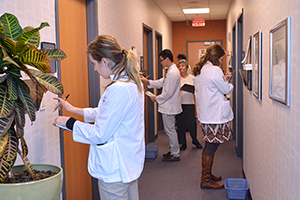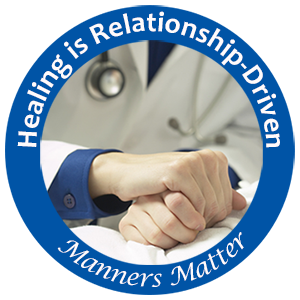Student Information
 You are probably wondering what a Standardized Patient is and why you are working
with them instead of real patients. A Standardized Patient is a person who has been
carefully trained to portray an actual patient. Research has found that these types
of encounters have certain advantages that cannot be duplicated by the use of paper
problems, role playing, questionnaires, or even real patients. The advantages include:
You are working in a controlled, reproducible clinical situation; the clinical problem
is present at any time or any place; it provides a unique opportunity to practice
the various skills; and, most importantly, the Standardized Patient can provide you
with objective and unbiased feedback.
You are probably wondering what a Standardized Patient is and why you are working
with them instead of real patients. A Standardized Patient is a person who has been
carefully trained to portray an actual patient. Research has found that these types
of encounters have certain advantages that cannot be duplicated by the use of paper
problems, role playing, questionnaires, or even real patients. The advantages include:
You are working in a controlled, reproducible clinical situation; the clinical problem
is present at any time or any place; it provides a unique opportunity to practice
the various skills; and, most importantly, the Standardized Patient can provide you
with objective and unbiased feedback.
Remember, the Standardized Patient is not meant as a replacement for experience with real patients but rather as a highly realistic learning resource. This method will allow you to try out a variety of approaches to a patient problem in a safe environment and without causing harm to a real patient. The goal of these encounters is not to try and cure the patient but to achieve the educational goals.

Standardized patients have been trained to expect the same treatment as if they were the actual patient, and they will interact with the clinician accordingly. Feedback as to how the Standardized Patient felt as a recipient of care by a particular clinician or group may be verbal or written. Occasionally, the Standardized Patient is also trained in medical illness and is prepared to provide feedback on specifics of examination technique or diagnosis.
Standardized Patients are playing the role of someone else from the time they meet
you until the history and physical are completed. Usually the patient role is that
of a new patient whom you have not previously met. You are yourself – a student.
The roles will be clearly defined before each session begins. You both will stay
in role until the feedback session.
 |
"Success in medicine and success in life directly relates to our ability to relate to each other" Dr. James L. Madera |


